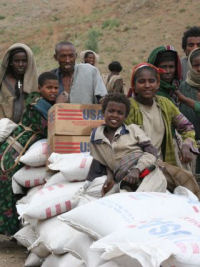Productive Safety Net Program (PSNP)
Date of Operation: 2011-2016
Primary Implementing Partners:
Catholic Relief Services (CRS), Food for the Hungry (FFH/Eth), Relief Society of Tigray (REST), Save the Children (SC)
Other Implementing Partner(s): Ethiopian Catholic Church-Social Development & Coordinating Office of Harar, Wonji Catholic Church, and Organization for Rehabilitation and Development in Amhara (ORDA)
Regions of Operation: Operates in 318 Woredas: Amhara, Dire Dawa, Oromia, Somali, and Tigray
Goal:
Respond to food-gap of Ethiopia’s chronically food insecure households and develop long-term solutions to household food insecurity.
Project Objectives:
- Transfer of resources to chronically food-insecure households via food-for-work program and other activities
- Provide food and nutrition to destitute beneficiaries (disabled, terminally sick, elderlies, orphans and vulnerable children)
- Improve nutritional practices by improving and expanding dietary diversity and access to diverse, locally-available foodstuffs
- Improve soil fertility and strengthen natural resources conservation practices
Description:
In 2005, the Government of Ethiopia launched the Productive Safety Net Program (PSNP) with USAID and other donors as a new coalition committed to resolving Ethiopia’s increasing need for food aid and other humanitarian assistance. PSNP also receives funding from Food for Peace Title II resources. In its 2005-2009 phase, PSNP annually contributed to meet the food needs of 7.8 million people. The public works program contributed to the rehabilitation of nearly 40,000 hectares of land, as well as the construction of irrigation structures, classrooms, health posts, rural roads and water supply schemes. Additionally, USAID-supported non-governmental organization (NGO) programs undertook a similar range of activities, with a focus on nutrition, health education, microenterprise and livelihood diversification.
USAID's new PSNP/Development Food Aid Program (DFAP), in support of the PSNP, beginning in 2011 builds on programs of the past years to protect household assets and build community assets. New institutional arrangements distribute responsibilities, enabling PSNP to increase its scale, scope and coverage. Additionally, greater monitoring and accountability allows for improved early warning and response.
PSNP continues to transfer resources primarily through a food-for-work program, known as the “public works” program. Those beneficiaries who are able will engage in public works in exchange for an agreed-upon food ration. These activities support beneficiaries on another level through focus on development of community assets like economic and social infrastructure assets (markets, roads, schools, clinics) and restoration of soil, water, forest and other natural resources.
Partners work in the areas of nutrition, social assistance, agriculture and environment to protect poor households’ assets and provide opportunities to diversify livelihood options. The new phase incorporates improved nutritional practices through the expansion and improvement of dietary diversity, access to locally-available foodstuffs, and training programs on basic gardening and animal husbandry.
By providing social assistance to destitute beneficiaries, PSNP encourages the Government of Ethiopia and communities to include these populations in development programs. The program also intensifies and improves techniques for conservation and other natural resources conservation. This, in turn, will help stabilize the environment and contribute to increased crop and livestock productivity, diversifying sources of household income and providing better risk management during the agricultural production cycle. USAID works with multiple partners toward completing Feed the Future’s objectives of increased growth and resiliency in rural Ethiopia.
Expected Results:
- Smoothing of food consumption gap and prevention of asset depletion for food insecure households in chronically food insecure woredas
- Improved access to services and conservation of natural resources
- Rehabilitation and enhancement of the natural environment through labor based on public works in exchange for food.

